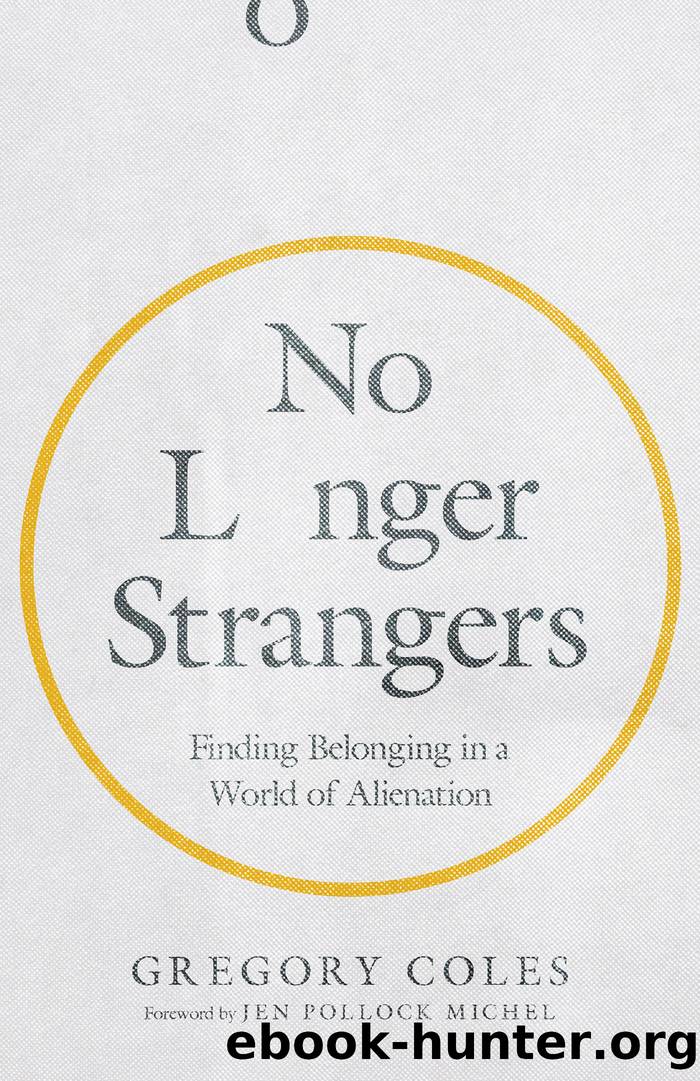No Longer Strangers by Gregory Coles

Author:Gregory Coles
Language: eng
Format: epub
Tags: belonging;third culture kid;alien;stranger;gay Christian;LGBT in Christ;how to belong;belong in jesus;blend in;belonging in Jesus;celibate gay Christian;belonging in the church;memoir;gay Christian memoir;memoir about belonging;fit in;fitting in;don't have to fit in
Publisher: InterVarsity Press
Published: 2020-12-21T14:10:35+00:00
I am not, in the physiological sense of the word, a eunuch. And yet, based on the amount of sex Iâm currently having and the number of biological offspring I expect to leave behind when I die, the distinction between me and a eunuch sometimes feels negligible.
I am, as far as I can tell, precisely the kind of person Jesus has in view when he says in Matthew 19, âThere are eunuchs who were born that way, and there are eunuchs who have been made eunuchs by othersâand there are those who choose to live like eunuchs for the sake of the kingdom of heaven.â I seem to fit that third category rather well: the people who live a sexless and childless life, not because they have no other options, but because they truly believe that the kingdom of heaven is worth every ounce of their devotion.
For people of Jesusâ day, one of the great tragedies of a eunuchâs life was that he would never have the opportunity to become a biological parent. His bloodline would end the day he died, leaving no one behind to carry on his legacy or to prove that his time on earth had mattered. Infertile women of that era faced the same fear. So did every married couple unable to conceive children together for any reason. To be without offspring was to go unremembered.
Perhaps itâs fitting that Jesusâ next act in Matthew 19âjust after describing people who, like Jesus himself, live as eunuchs by choiceâis to place his hands on and pray for the little children who are brought to him. He doesnât withdraw from the lives of children simply because heâs not the one parenting them. On the contrary, Jesus declares children central to the kingdom of heaven. He invests in them, takes them seriously, invites them to follow in his footsteps of passionate love for God and neighbor.
For Jesusâ disciples, biological parenting isnât meant to be the only way we leave a legacy or build a family. Itâs not even meant to be the primary way we leave a legacy or build a family. Jesus treats the family of God as something much more substantial than just a pretty metaphor. It is a concrete claim, a literal state of being. Those who follow God together are family to one another.
At the end of Matthew 19, Jesus promises that the people who give up the usual trappings of home and spouse and children for the sake of the gospel will receive a hundred times as much in return. In short, he is promising us the family of God. He is promising us to one another. If this promise doesnât sound like good newsâif the family of God sounds like a cheap substitute for a spouse and a picket fence and two-and-a-quarter childrenâperhaps itâs because we in the church have failed to really live like family to one another.
Do we believe that nuclear family is in some way superiorâmore permanent, more dependable, more meaningful, more concreteâthan spiritual family? Jesus certainly didnât seem to.
Download
This site does not store any files on its server. We only index and link to content provided by other sites. Please contact the content providers to delete copyright contents if any and email us, we'll remove relevant links or contents immediately.
The 5 Love Languages: The Secret to Love That Lasts by Gary Chapman(9768)
The Space Between by Michelle L. Teichman(6921)
Assassin’s Fate by Robin Hobb(6192)
Wiseguy by Nicholas Pileggi(5762)
Everything Happens for a Reason by Kate Bowler(4729)
Gerald's Game by Stephen King(4631)
Pillow Thoughts by Courtney Peppernell(4268)
A Simplified Life by Emily Ley(4154)
The Power of Positive Thinking by Norman Vincent Peale(4050)
Harry Potter and the Prisoner of Azkaban (Book 3) by J. K. Rowling(3346)
Resisting Happiness by Matthew Kelly(3332)
Girl, Wash Your Face by Rachel Hollis(3273)
Being Aware of Being Aware by Rupert Spira(3264)
The Code Book by Simon Singh(3167)
The Secret Power of Speaking God's Word by Joyce Meyer(3154)
More Language of Letting Go: 366 New Daily Meditations by Melody Beattie(3017)
Real Sex by Lauren F. Winner(3002)
Name Book, The: Over 10,000 Names--Their Meanings, Origins, and Spiritual Significance by Astoria Dorothy(2967)
The Holy Spirit by Billy Graham(2938)
